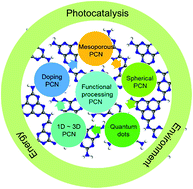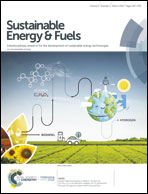Advances in constructing polymeric carbon-nitride-based nanocomposites and their applications in energy chemistry
Abstract
Polymeric carbon nitride (PCN) has attracted much attention because of its unusual properties and prospective applications in many fields, including heterogeneous catalysis, photocatalysis, supercapacitors, and electrocatalysis. Therefore, it is imperative to design nanostructured and nanoporous PCN-based materials with tunable electronic properties for specific applications. This feature review summarizes the progresses made in the construction of PCN-based materials with controllable structures and morphologies, ranging from mesoporous PCN and quantum dots to three-dimensional structures. In addition, the functional processing of PCN via doping with nonmetal and metal atoms at the atomic level is presented in this review, where tunable energy levels were achieved. In particular, benefiting from the large amount of “nitrogen pots” in PCN, single atoms anchored on the surface of PCN were successfully constructed for boosting its catalytic performance in specific reactions. Moreover, various heterogeneous catalysis applications, such as the catalytic oxidation of petroleum-based feedstocks, water splitting, and photoreduction of CO2, have also been discussed on the basis of nanostructured PCN materials. Finally, this comprehensive review gives some opinions on the crucial issues and future study directions in exciting fields. We anticipate that this review can inspire researchers to extend the applications of PCN and develop more PCN-based materials possessing novel nanostructures and electronic properties.



 Please wait while we load your content...
Please wait while we load your content...